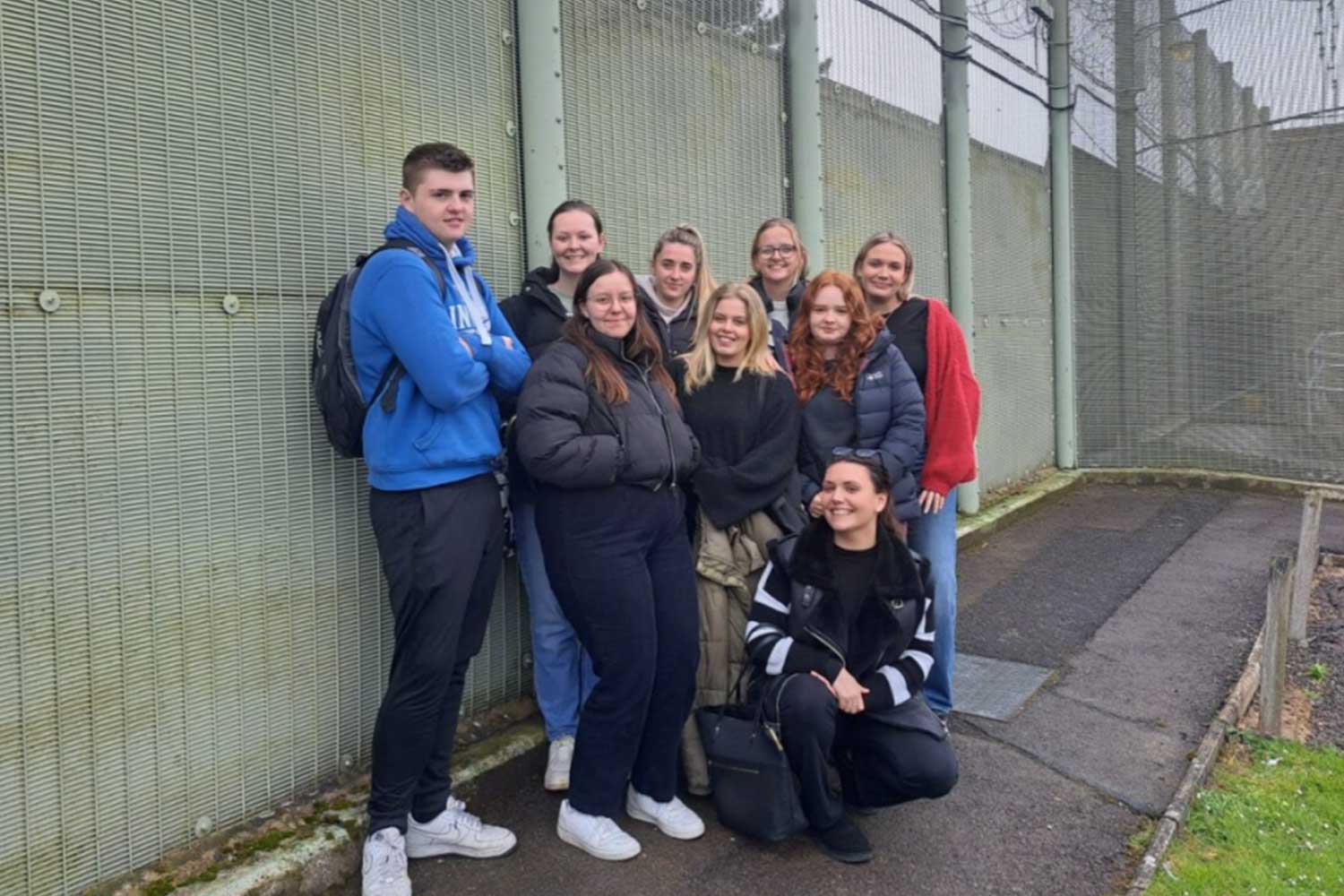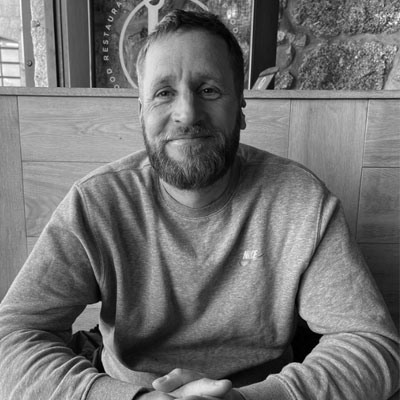Criminology and Sociology
BSc (Hons)
Undergraduate degree - combined honours
- UCAS codes: Institution B20, Course D32H or SE74 (with professional placement year)
- Criminology - Programme Document
- Sociology - Programme Document
Investigate, scrutinise and understand the causes, consequences and responses to crime with our Criminology degree at Bath Spa University.
- A programme of study which focuses on criminological, sociological and psychological perspectives of crime.
- Examines crime, justice and punishment at local, national and transnational levels of society.
- A theoretical and applied approach to criminology to develop your knowledge and skills.
Criminology explores the causes, motivations and patterns of crime. In addition to improving our knowledge and understanding of crime, criminology also considers responses to crime and informs policies and practices in policing, law, criminal justice and punishment.
With our Criminology degree, you'll study crime from a variety of approaches, gain practical and relevant experience, and develop transferable skills that you can take into a range of careers and employment sectors.
Joint #4 in the UK
for Value Added in Criminology (Guardian University Guide 2025)
What you'll learn
Criminologists study crime from a variety of approaches, making this a diverse field of study. Core modules focus on the main theories, debates, issues and research in criminology and criminal justice, while optional modules enable you to develop your particular interests in areas such as violent crime, victimisation, prisons and terrorism.
We’ll support and encourage you to gain practical experience in relevant fields through voluntary work and placements. You’ll develop practical and analytical skills as well as subject knowledge in crime and criminal justice.
Year one
You’ll learn about the research traditions of criminology and be introduced to key concepts, theories and issues. You’ll investigate different types of crime and you’ll also learn about criminal law and criminal justice agencies and institutions.
Year two
You'll study contemporary debates in criminology and criminal justice and the history and development of policing, crime control and prevention.
You can also choose from a number of optional modules to create a programme tailored to your personal interests. You can investigate the criminological imagination by exploring differing perspectives and theories within criminology. You can also study violent crimes such as homicide and robbery.
Year three
You’ll undertake an original piece of criminological research in an area that interests you and you’ll also be able to examine terrorism, punishment and penology and victimisation with our optional modules. You’ll have the choice to take our optional module in criminology which involves working with prison learners through a partnership with HMP Erlestoke.
There will also be opportunities to undertake a voluntary placement in an organisation relevant to the criminal justice sector with our optional community engagement module.
We use a range of assessments to gain a comprehensive measure of your performance. Assignments may include essays, book reviews, examinations, portfolios, crime scene investigation reports, presentations, design of a non-custodial punishment, reflective writing, briefing papers and individual and group projects.
We take pride in our innovative and engaging modules that inspire and challenge, and we encourage you to reflect critically on your subject.
We’ll guide you through your studies, support you, and help you make the most of your academic studies. Your personal timetable will comprise all the modules for which you have been registered, and these incorporate different modes of teaching.
You’ll participate in a wide variety of activities including lectures, seminars, workshops, one-to-one tutorials, and sessions with visiting speakers.
To find out more about how we teach and how you'll learn, please read our Learning and Teaching Delivery Statement.

Third-year BSc (Hons) Criminology students visiting HMP Erlestoke as part of a unique module where students learn criminology alongside prison learners.
Opportunities
As part of your degree, you could study abroad on a placement at one of Bath Spa’s partner universities.
We’ll strongly encourage you to take advantage of placement opportunities in your second and third year, so you can apply your learning in the real world contexts of criminal justice. Practitioners contribute to teaching in some modules and you can find out more from them about working in fields related to criminal justice.
Fieldwork opportunities, such as trips to local courts, will also provide opportunities to observe the legal system in action and learn more about potential careers. We also have links with local criminal justice organisations including local police services and prisons.
Project work enables you to focus on your particular interests and is built into all three years of the programme. Through individual and group projects you’ll develop employment-related skills in research, analysis, time management, leadership, problem-solving and planning.
Your first year involves a project with creative, critical and reflective elements.
Moving into your second year, you’ll undertake in-depth study of the spatial dimensions of crime. A module in research methods will give you experience of research design and data collection and analysis to support project work.
In the dissertation core module in your third year, you can apply the knowledge and skills you’ve developed to an independent research project on any criminological or criminal justice topic that interests you.
A qualification in Criminology will prepare you for a career in a variety of relevant fields in criminal justice and associated social and welfare professions including:
- Policing
- Crime prevention and security
- Crime reduction initiatives
- Law (following further study)
- Offender management and interventions
- Prisons
- Probation
- Youth justice
- Social work
- Community development
As a social sciences degree, the course will give you with a range of transferable skills which you can take into a career in a number of others sectors such as health and social care, marketing, HR, teaching or the media.
If you’re a full-time undergraduate student starting your first year at Bath Spa University, you can apply for the Certificate in Global Citizenship, which you’ll study alongside your degree.
You’ll gain global awareness and add an international dimension to your student experience, and funding is available. On successful completion of the programme, you’ll be awarded a Certificate in Global Citizenship. This is in addition to your degree; it doesn’t change your degree title or results.
"The chance to take part in various field trips in the final year was amazing and really solidified all that we learned in the three years preceding the trips. Additionally, a placement year enabled me to secure postgraduate employment ahead of finishing university."
Jasmine Henry, BSc (Hons) Criminology with Professional Placement Year
Professional placement year
The Professional Placement Year (PPY) provides you with the opportunity to identify, apply for, and secure professional experience, normally comprising one to three placements over a minimum of nine months. Successful completion of this module will demonstrate your ability to secure and sustain graduate-level employment.
By completing the module, you'll be entitled to the addition of 'with Professional Placement Year' to your degree title.
Before your PPY, you'll work to identify roles of interest and secure a placement. The Placements Team will support through timetabled sessions and 1:1 appointments.
As well as completing a minimum of 900 placement hours, you will complete two assessments demonstrating your skill development, growth in professional behaviours and how the PPY has impacted your future career aspirations.
Facilities
Criminology is taught at our Newton Park campus.
All modules can be found on our Virtual Learning Environment, Ultra, providing unlimited online access to learning materials such as handbooks, lecture slides, assessment information, discussion boards and other resources.
Our library gives you access to books, academic journals and DVDs and an extensive range of electronic services. It also provides a place for individual study and collaborative work.
Fees
| Student | Annual tuition fee |
|---|---|
| UK full time | £9,535 |
| UK part time | £4,768 |
| International full time | £16,460 |
Professional Placement Year
During the placement year, the fee is reduced to 20% of the full time fee. This applies to UK and EU/International students.
- UK: £1,905
- International: £3,292
Additional course costs
You may need to pay additional course costs over and above your tuition fees, for example, for specialist equipment or trips and visits. Please check the course Programme Document (linked under the main image on this page) for details of any additional costs. You can also read our Additional Course Costs Policy for further information.
Funding opportunities
Please visit our Funding pages for an overview of the funding options that may be available, including scholarships and bursaries.
Interested in applying?
We’re looking for individuals who are interested in all aspects of crime, justice and punishment.
You’ll be looking to study these issues from varying perspectives including psychological and sociological, that challenges conventional or ‘common sense’ notions of criminality.
We accept a wide range of qualifications for entry to our undergraduate programmes. The main ones are listed below:
- A Level – grades BBB-BCC preferred.
- BTEC – Extended Diploma grades from Distinction Distinction Merit (DDM) to Distinction Merit Merit (DMM) accepted in any subject.
- T Levels – grade Merit preferred.
- International Baccalaureate – a minimum of 32 points are required.
- Access to HE courses – typical offers for applicants with Access to HE will be the Access to HE Diploma or Access to HE Certificate (60 credits, 45 of which must be Level 3, at Merit or higher).
If you don’t meet the entry requirements above, we may be able to accept your prior learning or experience from outside of formal education. See our Accreditation of Prior Learning (APL) page to learn more.
English Language Requirements for International and EU Applicants
IELTS 6.0 - for visa nationals, with a minimum score of IELTS 5.5 in each element.
Course enquiries
For further information about the programme or entry requirements, please email us at admissions@bathspa.ac.uk.
Ready to apply? Click the 'apply now' button in the centre of this page. Need more guidance? Head to our how to apply pages.
Programme leader: Faye Vanstone
Email address: f.vanstone@bathspa.ac.uk
Three year course
With placement year
Fascinated by social issues? Want to help make the world a better place? Our Sociology degree could be for you.
- In our fast-changing world, Sociology is exciting, relevant and provides essential skills.
- Learn to tackle problems creatively and make better decisions, applying your knowledge to specific issues.
- Choose to specialise in specific areas of the subject, such as education and crime.
Do you want to know more about the world we live in? Do you care, and want to make a difference? If so, you’re well-suited to a Sociology degree at Bath Spa.
Sociology is the study of societies, cultures, and groups. We live in complex societies, with laws and informal rules that govern how we interact. Sociology helps you understand more about yourself, others and how society is organised.
#1 in South West
for Satisfaction with Feedback in Sociology (Guardian University Guide 2025)
Joint #8 in UK
for Value Added in Sociology (Guardian University Guide 2025)
“Sociology helps me piece things together and see the world how it really is. The campus at Bath Spa is beautiful! It’s a really peaceful place to think and the lecturers are passionate about what they teach.”
Kirsty Taylor, Sociology student
What you'll learn
You’re taught about society, social groups and social organisation. You’ll learn about social problems and social policies.
Learn how to make sense of social change and conflict, and gain a good understanding of social differences, inequalities and social divisions.
Apply your knowledge and skills to specific problems and issues to help you become a good decision-maker.
Year one
You’ll be introduced to sociology, and the techniques and philosophies of the social sciences. You'll focus on identities – beginning with thinking about your own identity, and building your knowledge and understanding so that you're more familiar with social divisions, structures, and the influence of culture. You’ll also learn how to visualise the most important components of society.
Year two
The second year builds on the first and teaches you about the history of and key ideas within sociology. You can also specialise in more specific areas of the subject, such as education and crime. You’ll undertake practical training in research skills. This will enable you to complete your final year project, and prepare you for the kind of employment that you’ll typically undertake as a sociology graduate.
Year three
You’ll concentrate on an aspect of sociology that most interests you in your final dissertation, undertaken with the support of a member of staff as a supervisor. You can also focus on more detailed subjects, such as globalisation, environment, ethnicity and gender.
Assessments vary and may include essays, reports, book and article reviews, seen and unseen examinations, portfolios, projects, learning journals, individual and group work, videos and screencasts, and research projects.
You’ll be taught in lectures, seminars, individual and group tutorials, and through our extensive online learning support environment.
To find out more about how we teach and how you'll learn, please read our Learning and Teaching Delivery Statement.
Opportunities
As part of your degree, you could study abroad on a placement at one of Bath Spa’s partner universities.
We run optional visits to places such as criminal justice institutions and religious places of worship. You can take a dedicated fieldwork module.
We provide support in obtaining placements and making links with professionals, and we invite our Sociology graduates back to meet with you. Optional modules have links with professionals and visiting speakers built into the teaching and learning. This means you’ll learn about the real-world application of what you're learning and be able to make more informed decisions about your future career.
A Sociology degree is useful for any career that involves working with people, either in the private, public or third sectors, typically:
- Management or administration in the public or private sector
- Human resource management
- Marketing and public relations
- Media or journalism
- Social work
- Youth and community work
- Health education or nursing
- Law
- Policing
- Offender management and interventions
- Work in the voluntary sector and fundraising
- Social research and analytics.
Employers such as the National Osteoporosis Society, the Ministry of Defence, Wiltshire Council and Truro College have recruited graduates from this course. Students have also gone into roles including Assistant Education Officer, Student Services Assistant and Relocation Advisor.
If you’re a full-time undergraduate student starting your first year at Bath Spa University, you can apply for the Certificate in Global Citizenship, which you’ll study alongside your degree.
You’ll gain global awareness and add an international dimension to your student experience, and funding is available. On successful completion of the programme, you’ll be awarded a Certificate in Global Citizenship. This is in addition to your degree; it doesn’t change your degree title or results.
Professional placement year
The Professional Placement Year (PPY) provides you with the opportunity to identify, apply for, and secure professional experience, normally comprising one to three placements over a minimum of nine months. Successful completion of this module will demonstrate your ability to secure and sustain graduate-level employment.
By completing the module, you'll be entitled to the addition of 'with Professional Placement Year' to your degree title.
Before your PPY, you'll work to identify roles of interest and secure a placement. The Placements Team will support through timetabled sessions and 1:1 appointments.
As well as completing a minimum of 900 placement hours, you will complete two assessments demonstrating your skill development, growth in professional behaviours and how the PPY has impacted your future career aspirations.
Facilities and resources
Sociology is taught at Newton Park campus.
You'll have access to excellent facilities and resources such as:
All modules can be found on our Virtual Learning Environment, Ultra, providing unlimited online access to learning materials such as handbooks, lecture slides, assessment information, discussion boards and other resources.
Our library gives you access to books, academic journals and DVDs and an extensive range of electronic services. It also provides a place for individual study and collaborative work.
Fees
| Student | Annual tuition fee |
|---|---|
| UK full time | £9,535 |
| UK part time | £4,768 |
| International full time | £16,460 |
Professional Placement Year
During the placement year, the fee is reduced to 20% of the full time fee. This applies to UK and EU/International students.
- UK: £1,905
- International: £3,292
Additional course costs
You may need to pay additional course costs over and above your tuition fees, for example, for specialist equipment or trips and visits. Please check the course Programme Document (linked under the main image on this page) for details of any additional costs. You can also read our Additional Course Costs Policy for further information.
Funding opportunities
Please visit our Funding pages for an overview of the funding options that may be available, including scholarships and bursaries.
Interested in applying?
We're looking for applicants who are concerned about social issues and social problems – maybe you’ve been part of a project group and taken a lead or tried to make a difference. You'll have a sense of social justice and fairness, and you'll be able to see things from different points of view.
We accept a wide range of qualifications for entry to our undergraduate programmes. The main ones are listed below:
- A Level - grades BBB-BCC preferred.
- BTEC – Extended Diploma grades from Distinction Distinction Merit (DDM) to Distinction Merit Merit (DMM) accepted in any subject.
- T Levels – grade Merit preferred.
- International Baccalaureate - a minimum of 32 points are required.
- Access to HE courses – typical offers for applicants with Access to HE will be the Access to HE Diploma or Access to HE Certificate (60 credits, 45 of which must be Level 3, at Merit or higher).
If you don’t meet the entry requirements above, we may be able to accept your prior learning or experience from outside of formal education. See our Accreditation of Prior Learning (APL) page to learn more.
English Language Requirements for International and EU Applicants
IELTS 6.0 - for visa nationals, with a minimum score of IELTS 5.5 in each element.
Course enquiries
For further information about the programme or entry requirements, please email us at admissions@bathspa.ac.uk.
Ready to apply? Click the 'apply now' button in the centre of this page.
Need more guidance? Head to our how to apply pages.
We recommend the following publications:
- The British Sociological Association (BSA)
The national subject association for sociologists in the UK. - Discover SocietyA free monthly online publication and web resource written by British sociologists.
Course leader: Dr Scott Kerpen
Email: s.kerpen@bathspa.ac.uk
Three year course
With placement year
- Award
- BSc (Hons) Criminology and Sociology
- School/s
- School of Sciences
- Campus or location
- Newton Park
- Course length
- Three years full time, or four years full time with professional placement year. Part time available.
- UCAS codes
- Institution Code: B20
- Course Code: D32H or SE74
- Campus Code: A,BSU
Entry requirements
We accept a wide range of qualifications for entry to our undergraduate programmes. The main ones are listed under 'Typical offers' in the main column below. For combined courses, please check both subjects. If your qualification is not listed, please email admissions@bathspa.ac.uk with your specific details.








